Movie Review: Anthill’s Progressive Tailors Club Is Unique, Colourful and Shallow
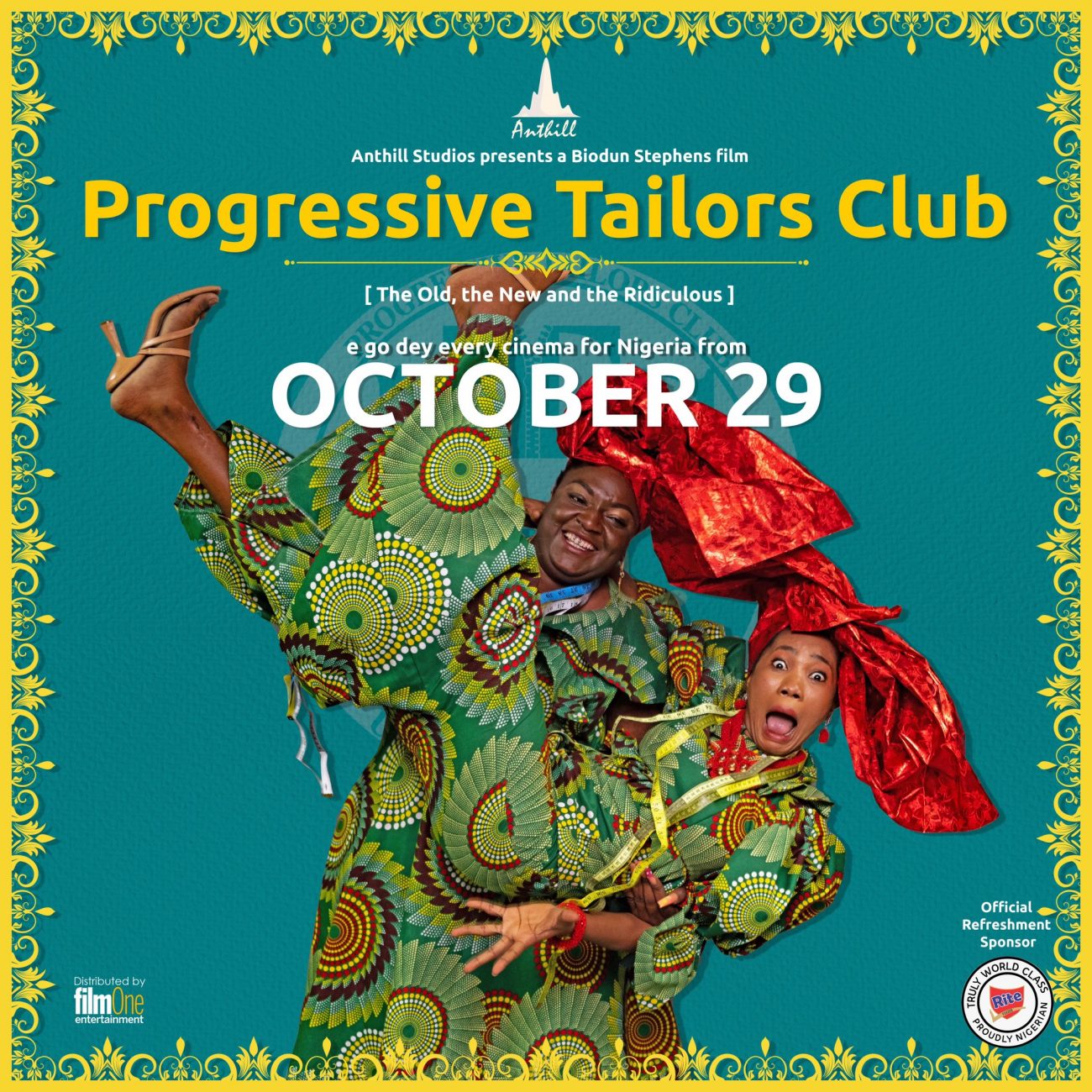
Progressive Tailors Club (PTC) is a long drawn attempt at observational comedy in modern Nollywood. Directed by Biodun Stephen and co-produced by Niyi Akinmolayan and Victoria Akujobi. Delivered from Anthill studios, the company responsible for films like The Wedding Party 2, The Set Up, Prophetess and more. PTC opens its plot on a group of 30 tailors, thereabout, whose leader recently passed away. The movie forces us to sit through their meetings, and the result is akin to what one would expect attending a gathering you care little to nothing about. You experience the good, bad, profound, funny, and learn a little about each character. Maybe, eventually getting to care for them.
The movie is delivered in a stage drama style, over 80% of its duration was shot in the PTC meeting hall— whose walls are as colourful as its members. The members seem to parody the different characters that make up a typical Nigerian meeting. Mr. Agbabiaka, the secretary, was played by veteran Femi Adebayo is boastful, with little substance. There is the macho Igbo man, Mazi Chibuzor, played by Uzor Arukwe who ticks all the boxes expected of a stereotype like him, he speaks a heavy accented English, and spices it with Igbo when he’s emotional. The late Rachel Oniga plays the treasurer, Beverly Osu plays Cynthia, a slay queen disillusioned by the club’s antics. But more dimensions are etched to her character as the plot progresses.
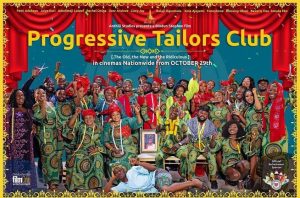
Their meetings are loud, and give way to too many trivialities. It might be on purpose, as this particular trait touches upon how much time we waste in meetings as Nigerians. Every aspect of the Nigerian experience in this situation is represented, there is the religious sycophant, Mummy Junior, played by Jaiye Kuti, whose acting was a breath of fresh air, as her body language added believability to her role. Eko plays a member that only cares about food, and Bolaji Ogunmola is cast as the serious, progressive member, Bisi, who seems to know what is best for everybody.
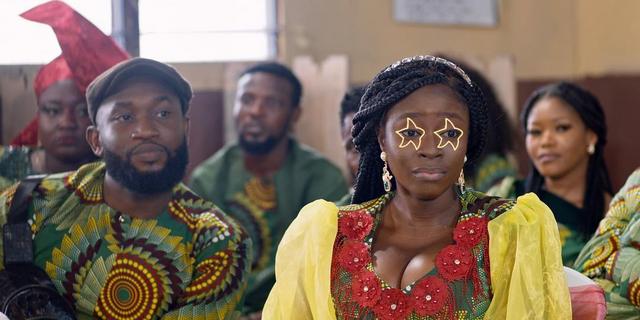


The major lapse that adds lumps to PTC’s enjoyability is a niggling sound engineering that always seems to draw the viewer out of experience. Whenever every member in the meeting spoke, their voices were loud with no point of reference within the meeting room. It was impossible to murmur, as it seemed every member had a mic at their lips. A quip at the back, is as loud as Agbabiaka’s relentless boasts. The one time a microphone is used by Madam Vice President, there was no change in audio output, only a weak microphone feedback sfx, tacked on in Post-Production. Audio engineering stamped the movie artificial, and once that came into my notice– it was quite difficult to enjoy anything else.
On the visual technical side, Progressive Tailors Club keeps the status quo in new Nollywood with standard cinematography. There were some dynamic motion graphics effect at the start that added some uniqueness to the film’s identity. There was a particular top-down shot applied while voting that seemed to give greater perspective to members of the group. This particular shot reinforced the unity within the PTC, as they all had a common goal at the time– which was to choose a leader. At every other moment, the PTC members bickered and argued. You have to admit, that single shot added an extra sense of awareness to the overall presentation.
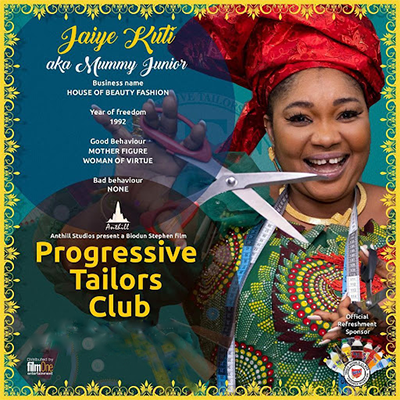


At a point, I wondered, what is the point of this film? Is this a form of satire on the Nigerian experience? If it was, then this observation stumbled on some parts, there was no awareness of self, little parallels drawn and the writing, and character did not quite hold up the quality of such a social statement. The little sliver of awareness shown was where food addict, Eko, who left just as the final meeting was about to start, walked in 3o minutes later and asked “You people are still here?’ That moment, he spoke for us all watching in the cinema, or at home if this ever makes it to Netflix
Or can the purpose behind this 2 hour flick be a keen observation on how the Nigerian ruling class takes advantage of its people? We could see traits of that as Madam Vice President used stomach infrastructure to buy the people’s loyalty. However, this falls short as the plot is opened deeper. A stab at complex social issues was watered down by accusations of ‘who slept with who?’, ‘who likes who?’ — which wouldn’t have been bad for the spectacle if we simply cared about the characters.
I felt the constant bullying of Lateef Adedimeji’s disabled character forebode a grand examining of how we treat handicaps in society, but that was a Chekov’s Gun that was never fired. Lateef’s character peaked at his declaration for President and his arc whittled out in exchange for slapstick jokes and cheap drama.
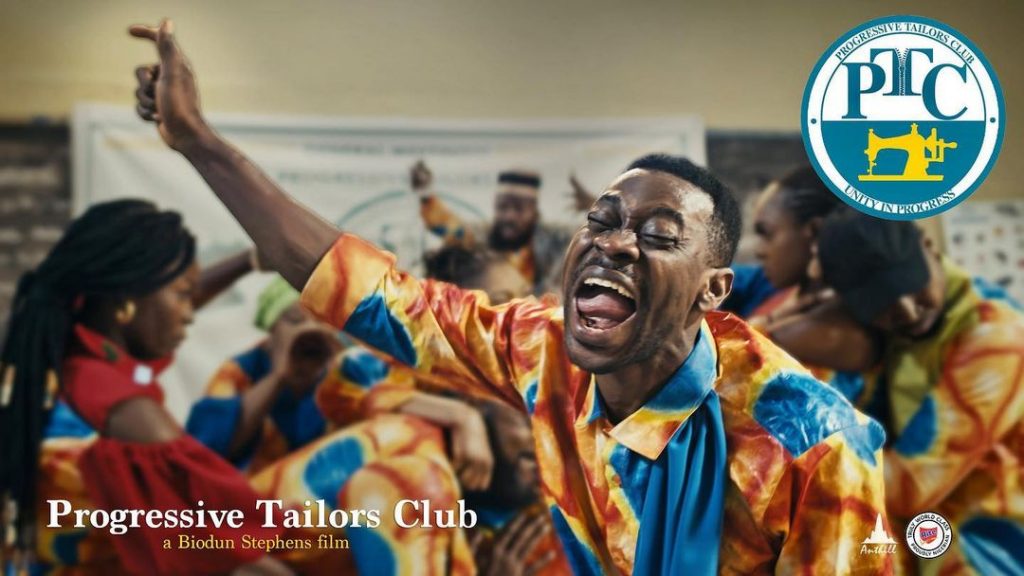


Progressive Tailors Club is simply a fictional tale about a group of tailors trying to outsmart each other and choose a leader. As the plot, and the characters in this movie fall short, little saving moments persist through the acting, delivery of certain bits— (Femi Adebayo’s vaunts of himself, after introducing other members comes to mind), and brief windows into the Nigerian experience act as consolation to what would have, otherwise been a time wasting endeavour. And I do not say that lightly.
About the Writer: Latonya Davies is passionate about films worth watching, popcorn worth eating, and quiet times destroyed by angry clattering of the keyboard.


NO COMMENTS